How Much is it to Replace Flooring in a House?
The cost of replacing flooring in a house can vary widely depending on several key factors. Firstly, the type of flooring selected plays a significant role in determining expenses. Hardwood floors, for example, can range from $8 to $28 per square foot or more, including installation costs. On the other hand, laminate flooring typically costs between $6 to $12 per square foot, inclusive of installation. Carpeting generally falls within the range of $4 to $15 per square foot, including installation. Tile, depending on the material (ceramic, porcelain, natural stone), starts around $8 per square foot and increases with higher-quality options.
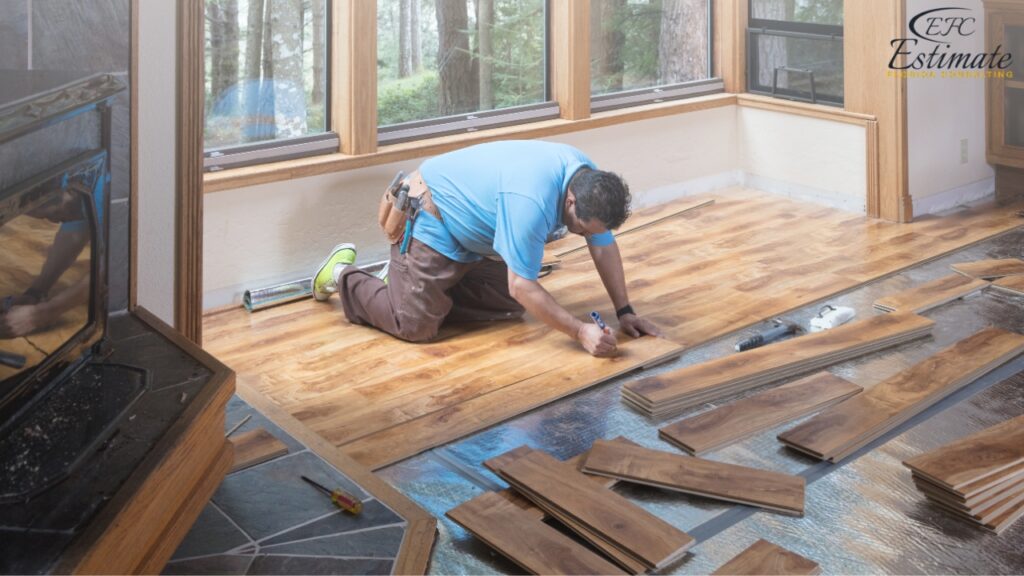
Cost To Replace Flooring By Room
The cost of replacing flooring can differ significantly from room to room, influenced by both the room’s size and the type of flooring selected. Whether you opt to renovate your entire house in one go or approach it room by room, these factors play a crucial role in determining expenses. Below is a breakdown of the average costs for replacing flooring in different rooms.
Room | Typical Size (square feet) | Updated Average Cost* |
Bedroom | 100 – 240 | $480 – $4,320 |
Bathroom | 40 – 50 | $240 – $960 |
Basement | 300 – 2,000 | $1,440 – $36,000 |
Kitchen | 64 – 200 | $360 – $3,600 |
Living room / Family room | 200 – 320 | $960 – $5,760 |
Laundry room | 35 – 100 | $168 – $1,800 |
Entryway / Foyer | 36 – 120 | $180 – $2,160 |
Bedroom
Bedrooms typically range in size from 100 to 240 square feet, accommodating varying furniture arrangements and space requirements. The updated average cost for renovating or constructing a bedroom falls between $480 and $4,320. Costs can vary significantly based on factors such as the quality of materials (flooring, paint, trim), the complexity of any structural changes (such as adding or modifying closets), and the inclusion of features like built-in shelving or window treatments. Additionally, costs may also be influenced by the region’s labor costs and availability of contractors.
Basement
Basements offer a broad size range of 300 to 2,000 square feet, presenting versatile opportunities for additional living space, entertainment areas, or storage. Renovating or finishing a basement is a significant project, with costs ranging from $1,440 to $36,000. Factors influencing costs include waterproofing and insulation requirements, flooring choices (carpet, laminate, tile), installing walls or partitions, adding electrical outlets and lighting fixtures, and incorporating amenities such as a bathroom or kitchenette. Additional costs may arise from compliance with building codes, especially when creating habitable space from unfinished areas.
Kitchen
Kitchens range in size from 64 to 200 square feet, serving as the heart of the home and often requiring functional layouts that accommodate cooking, dining, and storage needs. Renovating a kitchen involves costs between $360 and $3,600. Expenses typically cover cabinetry upgrades (custom or semi-custom), countertop materials (such as granite or quartz), appliance replacements or upgrades, flooring choices (hardwood, tile, vinyl), and the installation of plumbing fixtures and lighting. The complexity of the design, including the inclusion of islands or breakfast bars, as well as any structural changes like opening up walls or relocating utilities, can impact total renovation costs.
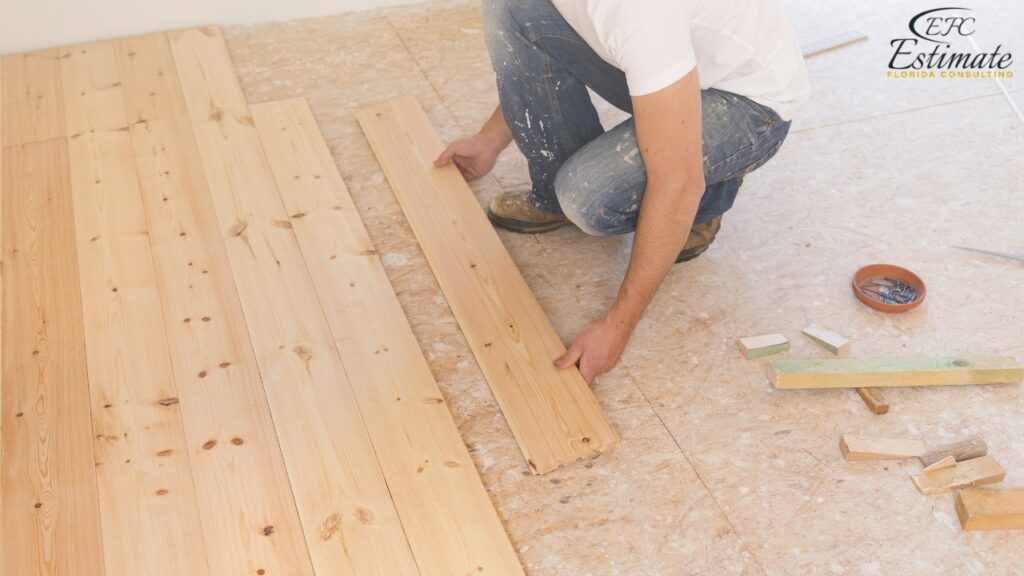
Living room / Family room
These spaces typically span 200 to 320 square feet, providing areas for relaxation, entertainment, and family gatherings. Renovation costs for living rooms or family rooms range from $960 to $5,760. Costs can vary based on the choice of flooring (carpet, hardwood, laminate), updates to windows and doors for improved insulation and aesthetics, installation of built-in shelving or entertainment centers, and the addition of decorative elements like crown molding or feature walls. Upgrading HVAC systems for improved climate control and energy efficiency may also contribute to overall renovation expenses.
Laundry room
Laundry rooms typically range from 35 to 100 square feet, focusing on functionality with space for washer/dryer units, storage cabinets or shelves, and utility sinks. Renovation costs vary between $168 and $1,800, depending on upgrades such as energy-efficient appliances, durable flooring (vinyl, tile), improved lighting and ventilation, and enhanced storage solutions for laundry supplies and household cleaning products. Plumbing modifications or additions may also impact renovation costs, particularly when installing or relocating laundry facilities within the home.
Entryway / Foyer
Entryways or foyers generally range from 36 to 120 square feet, serving as the first impression of a home and setting the tone for interior decor. Renovations in this area typically cost between $180 and $2,160. Expenses may include upgrades to flooring (tile, hardwood, or laminate), installation of attractive lighting fixtures or chandeliers, replacement or enhancement of doors and hardware, and the addition of functional elements like coat closets or shoe storage. Decorative touches such as mirrors, artwork, or accent furniture can further personalize and enhance the entryway’s aesthetic appeal.
New Flooring Cost Estimator
Determining the cost of new flooring involves several key factors, primarily the type of flooring selected and the scale of the project. The costs outlined in the table below provide an average range for both materials and labor, but these can vary significantly based on factors such as the specific flooring material chosen and the complexity of the installation.
Factor | Average Cost per Square Foot |
Materials | $2.20 – $7.70 |
Labor | $2.20 – $8.80 |
Total Installed Cost | $4.40 – $16.50 |
Factors Influencing Cost
Beyond material and labor costs, several other variables influence the overall expense of a flooring project:
Material Quality: Opting for higher-quality flooring typically translates to higher upfront costs but can offer greater durability and longevity compared to cheaper alternatives.
Stairs: Installing flooring on stairs is notably more challenging than on flat surfaces, which affects costs. Carpeting a staircase, for instance, averages between $165 to $660, with prices varying based on the style and complexity of installation, ranging from $11 to $49.50 per step.
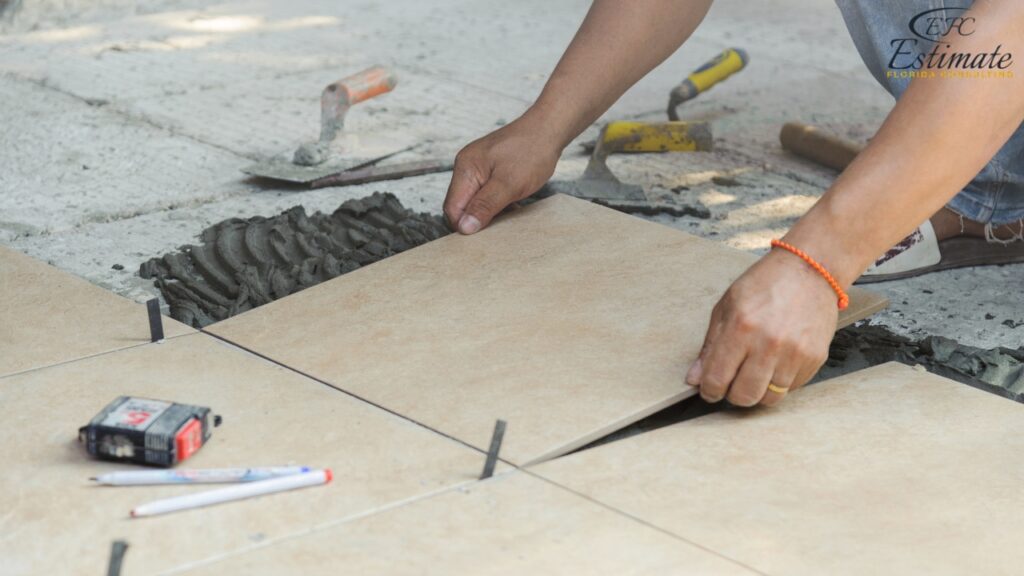
Hazardous Materials: Dealing with hazardous materials such as mold or asbestos can significantly increase project costs. Mold removal costs approximately $16.50 to $33 per square foot, while asbestos removal averages $4.40 to $16.50 per square foot.
Sealant or Finish: Certain flooring types like concrete, natural stone, and wood often require sealing as part of the installation process. Some contractors include this cost in their estimates, so it’s essential to clarify what’s covered upfront.
DIY vs. Professional Installation: While DIY installation can save on labor costs, professional installation ensures the job is done safely and correctly. DIY projects may also require additional tools and supplies, which should be factored into the overall budget.
Labor Costs
Labor costs for flooring installation range from $2.20 to $8.80 per square foot on average. Carpet installation, considered less complex, can start from as low as $0.55 per square foot. In contrast, intricate installations like heavy tile or poured terrazzo may command higher rates, sometimes reaching up to $22 per square foot due to the specialized skills and time involved.
Additional Labor Considerations
Additional expenses related to labor might include:
- Furniture Relocation: Some installers include moving furniture in their initial estimates, while others charge extra—typically $27.50 to $82.50 per room—if the homeowner opts not to relocate furniture themselves.
- Existing Floor Removal: The cost to remove and dispose of old flooring varies based on the material and amount to be disposed. For instance, carpet removal costs between $0.77 to $1.76 per square foot, whereas tile removal ranges from $2.20 to $7.70 per square foot.
- Underlayment Installation: Installing an underlayment is necessary for certain types of flooring (e.g., linoleum, laminate, vinyl, hardwood) to provide cushioning, insulation, and a smoother surface. Costs typically range from $0.55 to $3.85 per square foot.
- Repairs: Repairing or replacing the subfloor is sometimes necessary to ensure a stable base for the new flooring. Costs for subfloor replacement generally range from $2.42 to $5.22 per square foot, while repairing damaged hardwood floors can cost anywhere from $2.20 to $22 or more per square foot, depending on the extent of the damage and the material used.
Get 5 New Leads Next 7Days With Our System
- Multi-Family Building
- Hotel Building
- Hospital Building
- Warehouse Building
- High-Rise Building
- Shopping Complex
Flooring Cost per Square Foot by Type
Flooring prices can vary significantly depending on the material chosen. The table below provides a breakdown of material costs and total installation costs per square foot for various types of flooring.
Material | Material Cost per Square Foot | Total Installed Cost per Square Foot |
Bamboo | $3.75 – $10 | $8.75 – $21.25 |
Carpet | $1.25 – $6.25 | $2.50 – $10 |
Concrete | $3.75 – $8.75 | $7.50 – $15 |
Cork | $5 – $10 | $6.25 – $18.75 |
Engineered Wood | $2.50 – $11.25 | $8.75 – $25 |
Epoxy Flooring | $1.25 – $6.25 | $5 – $12.50 |
Hardwood | $5 – $18.75 | $13.75 – $31.25 |
Laminate | $1.25 – $7.50 | $5 – $17.50 |
Linoleum | $2.50 – $8.75 | $3.75 – $13.75 |
Luxury Vinyl Plank (LVP) | $2.50 – $12.50 | $5 – $20 |
Luxury Vinyl Tile (LVT) | $2.50 – $12.50 | $5 – $20 |
Marble | $6.25 – $25 | $12.50 – $50 |
Standard Vinyl Plank | $2.50 – $8.75 | $3.75 – $12.50 |
Standard Vinyl Sheet | $1.25 – $5 | $2.50 – $8.75 |
Standard Vinyl Tile | $1.25 – $6.25 | $2.50 – $12.50 |
Terrazzo (Tile) | $8.75 – $18.75 | $18.75 – $43.75 |
Terrazzo (Poured) | $12.50 – $62.50 | $25 – $87.50 |
Tile | $2.50 – $37.50 | $12.50 – $62.50 |
Bamboo
Known for its sustainability and durability, bamboo flooring ranges from $3.75 to $10 per square foot for materials and $8.75 to $21.25 for total installed costs. It’s available in various styles and finishes, including solid and engineered options. Bamboo offers a unique aesthetic with natural variations in color and grain.
Carpet
A popular choice for its comfort and affordability, carpet costs between $1.25 to $6.25 per square foot for materials and $2.50 to $10 for installation. Different styles such as plush, Berber, or frieze affect pricing, along with fiber type (nylon, polyester, wool). Carpet provides warmth and sound insulation but may require more maintenance than hard surface flooring.
Concrete
Durable and versatile, concrete flooring ranges from $3.75 to $8.75 per square foot for materials and $7.50 to $15 for installation. Options include stained, stamped, or polished finishes, each affecting the overall cost. Concrete is known for its strength and longevity, making it suitable for both indoor and outdoor applications.
Cork
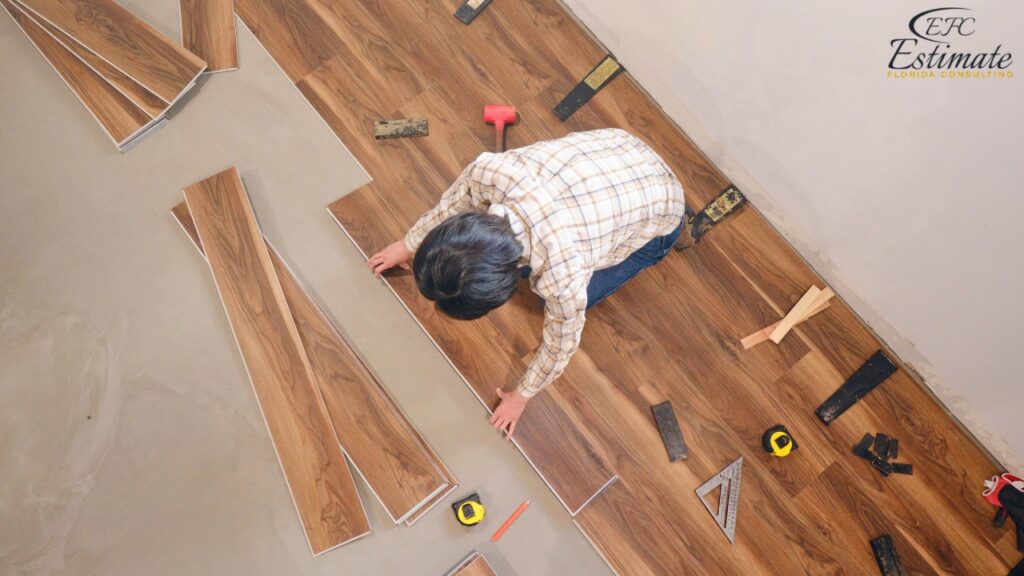
Environmentally friendly and comfortable underfoot, cork flooring costs $5 to $10 per square foot for materials and $6.25 to $18.75 for installation. It’s available in tiles or planks with natural variations in color and texture. Cork provides excellent thermal and acoustic insulation properties, ideal for reducing noise and maintaining warmth.
Engineered Wood
Combining real wood veneer with layers of plywood or fiberboard, engineered wood ranges from $2.50 to $11.25 per square foot for materials and $8.75 to $25 for installation. It offers greater stability and moisture resistance than solid hardwood, with a wide range of species and finishes to choose from.
Epoxy Flooring
Resilient and easy to clean, epoxy flooring costs $1.25 to $6.25 per square foot for materials and $5 to $12.50 for installation. It’s commonly used in high-traffic areas, garages, and commercial spaces for its durability and chemical resistance. Epoxy can be customized with various colors, patterns, and textures.
Hardwood
Known for its timeless beauty and durability, hardwood flooring prices vary widely from $5 to $18.75 per square foot for materials and $13.75 to $31.25 for installation, depending on wood species (oak, maple, walnut) and grade (select, premium). Hardwood enhances the aesthetic value of a home and can be refinished multiple times to extend its lifespan.
Laminate
A cost-effective alternative to hardwood, laminate ranges from $1.25 to $7.50 per square foot for materials and $5 to $17.50 for installation. It replicates the look of wood, stone, or tile with photographic layers sealed under a protective wear layer. Laminate is durable, scratch-resistant, and easy to maintain.
Linoleum
Renewable and durable, linoleum costs $2.50 to $8.75 per square foot for materials and $3.75 to $13.75 for installation. It’s made from natural materials like linseed oil, cork dust, and wood flour, offering antimicrobial properties and a wide range of colors and patterns. Linoleum is resilient and suitable for high-traffic areas.
Luxury Vinyl Plank (LVP) and Luxury Vinyl Tile (LVT)
Resilient and waterproof, LVP and LVT range from $2.50 to $12.50 per square foot for materials and $5 to $20 for installation. They mimic the look of hardwood, tile, or stone with realistic textures and embossed finishes. LVP and LVT are low-maintenance, durable, and suitable for moisture-prone areas.
Marble
Luxurious and elegant, marble flooring ranges from $6.25 to $25 per square foot for materials and $12.50 to $50 for installation. It’s available in various colors and patterns with distinctive veining, making each piece unique. Marble requires professional installation due to its weight and susceptibility to etching and staining.
Vinyl Flooring (Plank, Sheet, Tile)
Affordable and versatile, vinyl flooring options range from $1.25 to $7.50 per square foot for materials and $2.50 to $12.50 for installation, depending on the type chosen. Vinyl is available in a wide array of styles and colors, offering durability, moisture resistance, and easy maintenance.
Terrazzo
A durable and customizable option, terrazzo can be installed as tiles ($8.75 to $18.75 per square foot for materials, $18.75 to $43.75 installed) or poured ($12.50 to $62.50 per square foot for materials, $25 to $87.50 installed). It consists of marble, quartz, granite, or glass chips embedded in a cementitious or epoxy matrix, polished to a high sheen. Terrazzo is known for its longevity and aesthetic versatility.
Tile
Available in ceramic, porcelain, and natural stone options, tile costs $2.50 to $37.50 per square foot for materials and $12.50 to $62.50 for installation. Prices vary based on material (ceramic, porcelain, natural stone), size, pattern, and complexity of installation (straight lay, diagonal, mosaic). Tile is durable, water-resistant, and suitable for various applications from floors to walls.
Benefits of New Flooring
There are numerous advantages to installing new flooring, particularly if your current flooring is outdated or showing signs of wear and tear. Here are some detailed benefits:
Improve the Home's Overall Appearance
New flooring can dramatically enhance the aesthetic appeal of your home. Whether you choose hardwood with its rich grains, plush carpeting in vibrant colors, or sleek modern tiles, updating your flooring can transform the look and feel of any room. The fresh appearance of new flooring can complement existing decor or serve as a focal point for a room makeover.
Increase the Property Value
Investing in new flooring can significantly increase the value of your property. Potential buyers often prioritize updated flooring because it indicates a well-maintained home and reduces the need for immediate renovations. High-quality materials and professional installation can attract buyers and justify a higher asking price, making it a valuable investment in your property’s resale potential.
Enhance Comfort and Mood
New flooring contributes to a more comfortable living environment. For instance, carpeting provides warmth and softness underfoot, creating a cozy atmosphere in bedrooms or living rooms. Hardwood or laminate flooring enhances the elegance of common areas like dining rooms or hallways. The right flooring choice can also improve acoustics, reducing noise levels and creating a quieter, more relaxing space.
Reduce Allergens (When Replacing Old Carpet)
Old carpets can trap allergens such as dust, pet dander, and pollen, contributing to indoor air pollution and aggravating allergies. Installing new flooring, especially hypoallergenic options like hardwood, tile, or vinyl, can minimize allergen buildup and improve indoor air quality. These flooring materials are easier to clean and maintain, reducing the presence of allergens and creating a healthier environment for allergy sufferers.
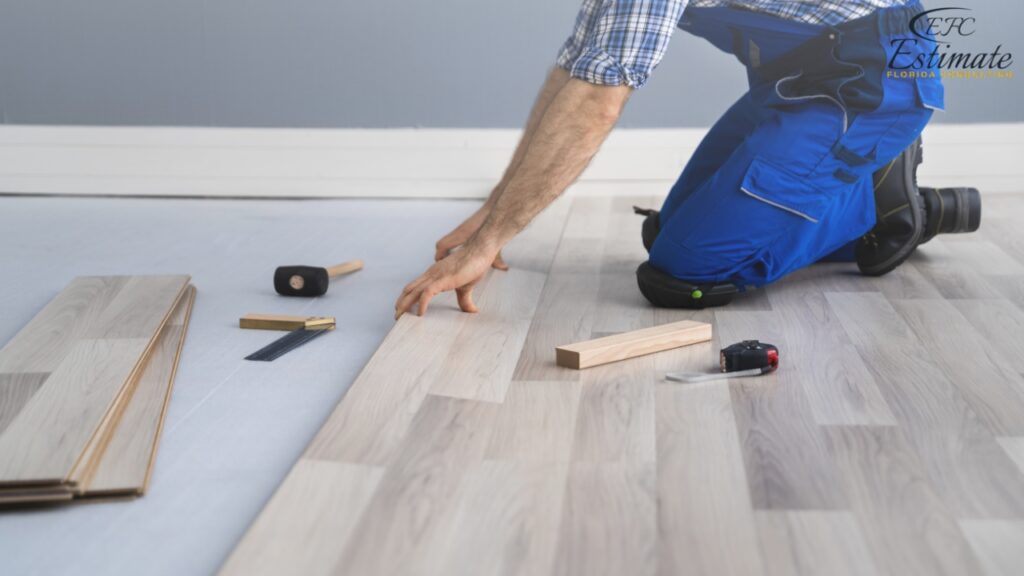
Increase Home Efficiency
Certain types of flooring, such as insulated laminate or cork, can improve home energy efficiency. These materials provide better insulation compared to older flooring options, helping to regulate indoor temperatures and reduce heating and cooling costs. Additionally, new flooring that’s well-sealed and installed can prevent drafts and airflow issues, enhancing overall energy efficiency throughout your home.
Considerations When Installing New Flooring
Before proceeding with new flooring installation, consider factors such as your budget, lifestyle needs, and the expertise of professional installers. Research different flooring materials and styles to find the best fit for your home’s aesthetic and functional requirements. Proper preparation, including removing old flooring and preparing subfloors, ensures a smooth installation process and long-term satisfaction with your investment.
Download Template For Flooring Project Breakdown
- Materials list updated to the zip code
- Fast delivery
- Data base of general contractors and sub-contractors
- Local estimators

Conclusion
Upgrading your home’s flooring offers a multitude of benefits that extend far beyond aesthetics. Beyond enhancing the overall appearance and increasing property value, new flooring can significantly improve comfort and mood by creating a more inviting and stylish living environment. It also contributes to better indoor air quality by reducing allergens, particularly when replacing old carpets. Moreover, energy-efficient flooring options can help lower utility costs by improving insulation and regulating temperatures. When considering a flooring renovation, it’s essential to weigh factors such as material quality, installation costs, and long-term maintenance requirements. By investing in high-quality materials and professional installation, homeowners can enjoy a durable and attractive flooring solution that enhances their home’s functionality and appeal for years to come.
FAQs
The cost of replacing flooring in a house varies widely based on factors like the type of flooring chosen and the size of the area. Generally, hardwood floors range from $8 to $28 per square foot, laminate costs $6 to $12 per square foot, carpeting is priced between $4 to $15 per square foot, and tile starts at around $8 per square foot. These estimates include installation costs.
The average costs for replacing flooring in different rooms vary based on size and flooring type. Here are some typical ranges:
- Bedroom: $480 to $4,320
- Bathroom: $240 to $960
- Basement: $1,440 to $36,000
- Kitchen: $360 to $3,600
- Living room / Family room: $960 to $5,760
- Laundry room: $168 to $1,800
- Entryway / Foyer: $180 to $2,160 These ranges reflect both material and installation costs.
Several factors can affect the total cost of replacing flooring:
- Type of flooring: Different materials have varying price points per square foot.
- Room size: Larger rooms require more materials and potentially higher labor costs.
- Quality of materials: Higher-quality flooring typically costs more but may offer better durability and aesthetic appeal.
- Complexity of installation: Factors like stairs, subfloor repairs, and furniture relocation can add to the overall expenses.
Flooring material significantly impacts the cost:
- Hardwood: $5 to $18.75 per square foot
- Laminate: $1.25 to $7.50 per square foot
- Tile: $2.50 to $37.50 per square foot
- Carpet: $1.25 to $6.25 per square foot Each material has unique characteristics and installation requirements that contribute to its pricing.
Yes, additional costs may include:
- Furniture relocation: Typically $27.50 to $82.50 per room if not done by the homeowner.
- Old floor removal: Costs vary by material, e.g., $0.77 to $1.76 per square foot for carpet removal.
- Underlayment installation: Generally $0.55 to $3.85 per square foot, depending on the flooring type.
- Repairs: Costs range from $2.20 to $22 or more per square foot for subfloor repairs or damaged hardwood.
To estimate total costs, consider both materials and labor:
- Materials: $2.20 to $7.70 per square foot
- Labor: $2.20 to $8.80 per square foot
- Total installed cost: $4.40 to $16.50 per square foot Actual costs may vary based on specific project details and regional labor rates.
Installing new flooring offers several benefits:
- Improved appearance: Enhances the overall look and feel of your home.
- Increased property value: Can boost resale value and attract potential buyers.
- Enhanced comfort: Provides better insulation and acoustics, depending on the material chosen.
- Health benefits: Reduces allergens and improves indoor air quality, especially with hypoallergenic flooring options.
- Energy efficiency: Certain materials help regulate indoor temperatures and reduce utility costs.
Google Reviews



Process To Get It Cost To Replace Flooring in a House Estimate Report
Here I am going to share some steps to get it cost to replace flooring in a house estimate report.
-
You need to send your plan to us.
You can send us your plan on info@estimatorflorida.com
-
You receive a quote for your project.
Before starting your project, we send you a quote for your service. That quote will have detailed information about your project. Here you will get information about the size, difficulty, complexity and bid date when determining pricing.
-
Get Estimate Report
Our team will takeoff and estimate your project. When we deliver you’ll receive a PDF and an Excel file of your estimate. We can also offer construction lead generation services for the jobs you’d like to pursue further.

